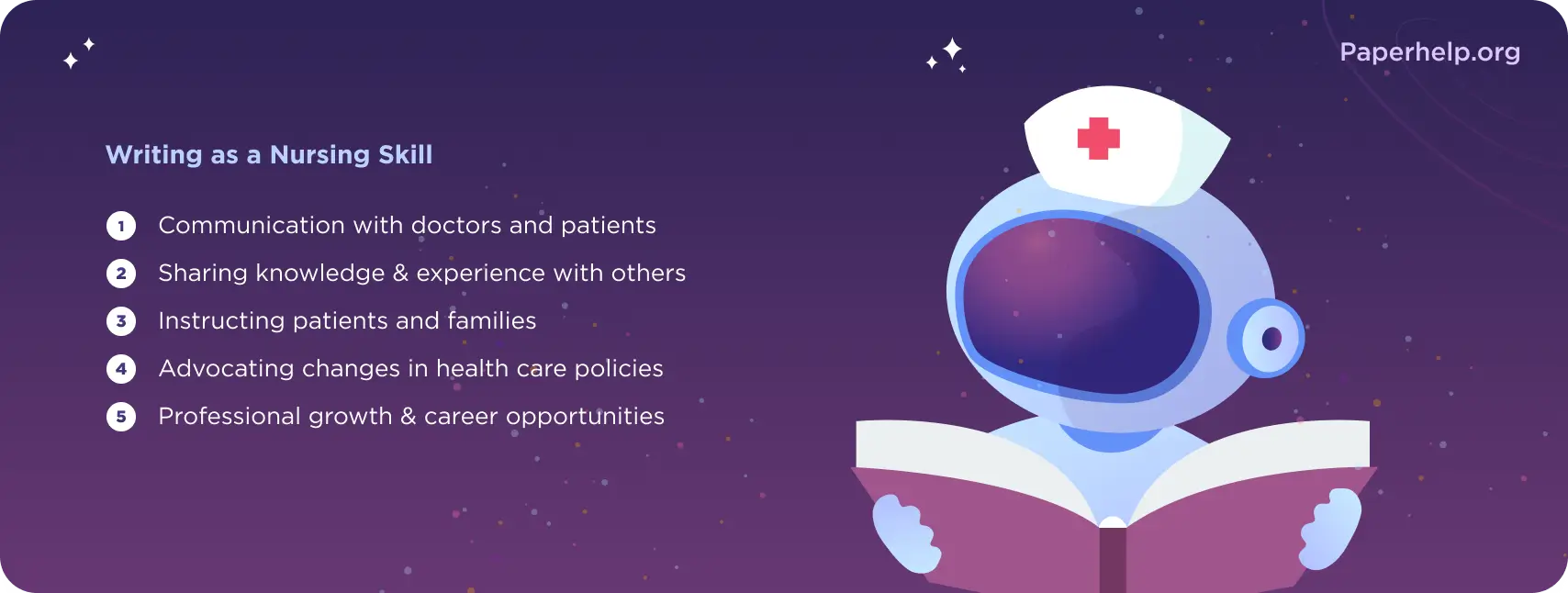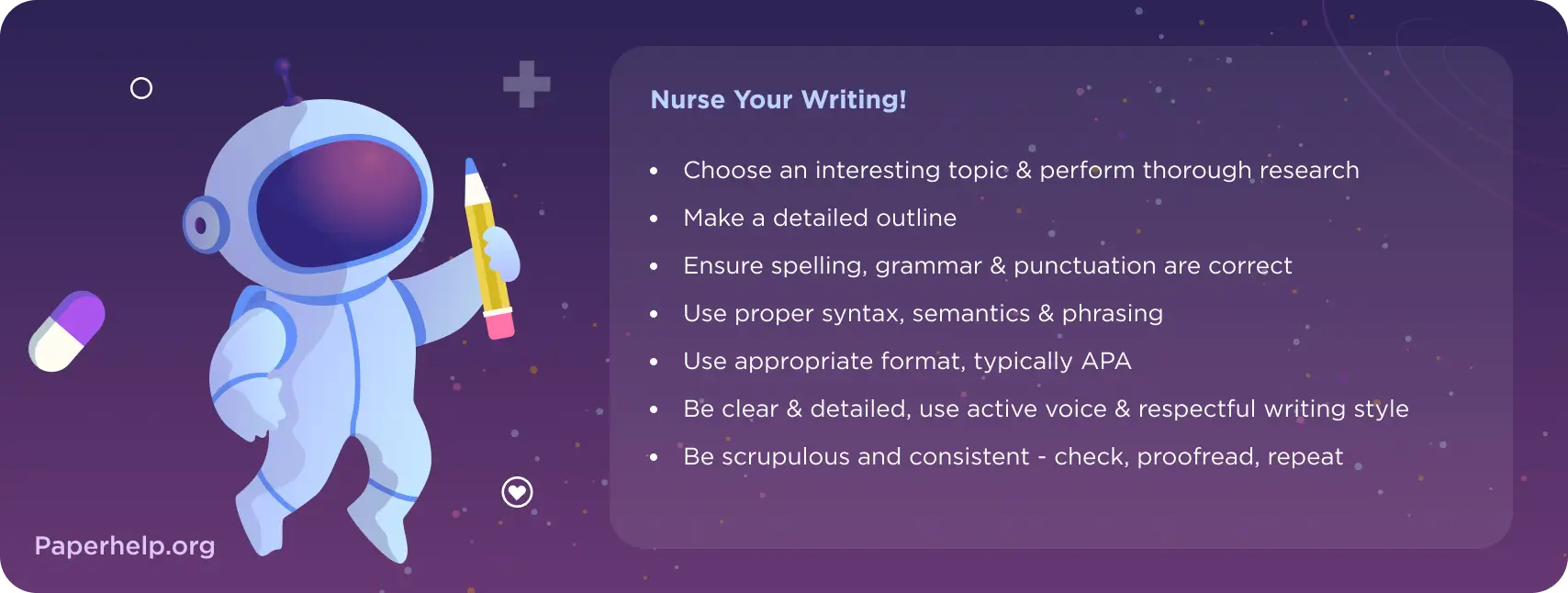The nursing profession attracts individuals interested in science and anatomy and naturally inclined to care and nurture. Desire to help others and empathy make this vocation rewarding. However, these same qualities may prove very taxing on the nurse's mental health over time. They are prone to exhaustion, stress, and depression that take their toll on their wellbeing. According to American Nurses Foundation Executive Director Kate Judge, these issues disproportionately affect nurses early in their careers. "As the future of our nursing profession, it is critical we give Millennials and Gen Z nurses the tools and time to recover and rebuild," said Judge.
This is why the analysis, self-reflection, and critical thinking skills that writing exercises build and hone are of invaluable help in preparing a student for the profession and preventing a practitioner from burning out.
If I hadn't known for myself (I have a close friend studying towards a degree in nursing), I would never have imagined that nursing students are required to be prolific essay writers on top of all the learning and practicing. Yet writing is as important to the nurse as dressing a wound or taking vitals. Why? Let's find out!
Why Writing is Important for Nurses

Depending on the nurse's role and setting of the practice, some types of writing will be more prevalent than others. The varied scope can be illustrated by (yet not limited to) the following:
- Writing is a major form of communication with doctors and patients. Nurses have to fill out many papers on their work with swiftness and precision: clinical records, reports, charts, etc. Effective communication and accuracy of medical information are of utmost importance.
- Writing articles about experimental projects, best practices, procedures, and policies allows sharing valuable knowledge with other professionals in the field and society as a whole.
- Instructions to patients, patient care plans, and family educational materials have a significant daily impact on the patients' health and wellbeing of the patients. These materials should be written in a clear, succinct, straightforward style.
- Posters, infographics, social media posts, blogs, and presentations educate, spread awareness of various conditions and health risks, thus contributing to public health. The ability to appeal to wide audiences with different reading levels and be clear and concise in carrying the point across is vital for nurses.
- Eloquent and well-argued political letters to legislators help influence health care policies on local, state, and federal levels. Elaina Mahlan, nurse, educator, and faculty member at Purdue University Global, highlights the crucial role of nursing experience. "When we're making the case for a change in legislation, that doesn't just involve raw statistical data, we need to be able to convey a human story in a way that moves people to action – and nobody sees those human stories like a nurse does," she argues.
- Cover letters, personal statements, CVs, and resumes are necessary for career growth and finding new job opportunities.
- Staff performance appraisals, proposals, and human resource reports are vital for managing positions in nursing.
Types of Nursing Papers for Students
Good writing is a lifelong learning goal. However, some types of writing are mostly confined to the classroom and rarely revisited after graduation. This does not diminish their importance for nursing students while still in training to join the profession. Here are some types of papers most often seen in the nursing courses curriculum:
- A narrative essay tells a story from the first-person perspective. In nursing, it is most often represented by personal statements.
- An expository essay aims to inform or explain. Such assignments are most often used to verify students' knowledge of the subject.
- A persuasive essay builds vital skills of disputing and proving a point and prepares students for defending their stance on public health issues and federal policies.
- A comparative essay evaluates theories, texts, opinions, approaches to treatment, etc.; it builds critical thinking and allows to choose between two options or suggest a synthesis.
- A cause and effect essay allows discussing the impact of varying factors on health issues and probability of various conditions as well as evaluating effects of different treatments.
- A case study promotes active learning by observing an individual patient, taking an in-depth look into their symptoms, medical history, and diagnoses.
Tips on Writing for Nurses
The two most critical qualities of good writing in nursing are clarity and objectivity. To achieve those, make sure you follow the established guidelines:
- Good grammar: correct subject/word agreement, correct pronoun usage, proper use of phonetically similar words (there/their/they're, your/you're, its/it's), and so on.
- Good syntax: avoid sentence fragments, run-on sentences, dangling modifiers.
- Good semantics: proper use of words according to their meaning. Don’t confuse similarly sounding words (eminent/imminent, lose/loose, affect/effect, who/whom, imply/infer, ensure/assure/insure, complementary/complimentary, etc.)
- If your instructor hasn't indicated otherwise in the assignment requirements, use APA as your default style and follow academic writing guidelines provided by your school's writing center.
- Respect your patient's dignity: sometimes it's difficult to distance yourself from their situation, especially if you are very invested in it emotionally. However, you should always remain objective and respect your patient in your writing. Instead of describing their conduct as "throwing a tantrum" or "acting crazy," detail what happens and let your readers draw conclusions themselves. For example, "Patient yelling, removing IV forcibly, and turning over the instrument tray."
- Be clear and detailed. This advice goes beyond describing the treatment and medication procedures. Even if it's just logging a dressing change, list step by step what you did, materials used, and how the patient reacted.
- Remember litigation and auditing. The best way to satisfy your most critical readers is to be scrupulous and consistent in your reports. To be above suspicions of negligence or non-compliance with doctor-ordered treatments, you should always be diligent in writing down all details of procedures conducted.

Example Topics for Nursing Essays
Now, here are some ideas to explore in your essays as a future or current nursing professional. I have grouped them by field of practice for easier navigation.
Nursing Leadership Topics
- Factors contributing to burnout and decision to leave the profession and ways to mitigate them
- The importance of chain of command for efficiency of care
- Qualities of a leader in the nursing profession: a self-reflection essay
- Gender imbalance in the profession: causes and ways to address the issue
- Career paths from nurse to physician
- The role of education for nurse leadership
- Ways to promote and enhance team spirit in healthcare
- HRM issues on the example of your clinic
- Styles of leadership in the emergency room management
- Adverse effects of understaffing on nurses and quality of patient care
- Inter-departmental collaboration to provide coverage during crisis situations
- Nursing shortages and possible solutions
Geriatrics and Palliative Care Topics
- Elderly care challenges and strategies to overcome them
- Tools emerging from technological advancement to monitor patients at home
- Strategies to help terminally ill with emotional coping
- Pain management in terminal cancer patients
- Exercises for fall prevention in elderly
- Assessing the quality of outpatient care
- Sexual health and challenges in geriatric patients
- COVID-19 comorbidities in elderly
- Patient care plans for patients with sensory system changes
- Environmental factors in aging and functional decline
- Importance of the vaccination for elderly patients
- The role of a nurse in care planning for terminally ill patients

Patient Safety and Ethics Topics
- Ethics of patient data collection and management
- Ethical dilemmas of euthanasia
- Ethics of geriatric care
- Ethical use of restraints in patients with severe mental health issues
- Ethics of infertility treatments
- Women's health and bodily autonomy: ethics in gynecological care
- Providing care for the homeless: ethical issues
- Ethics behind nursing uniforms and dress code
- Ethical questions of gender and patient's identity
- Implicit bias: race and culture in nurse-patient relations
- Gender dynamics within the chain of command: ethical dilemmas
- Respecting patient's personal boundaries and effective communication
Psychiatric Mental Health Nursing Topics
- Mental health treatment and regulations in the U.S.
- Cognitive hypnotherapy for managing pains of psychosomatic genesis
- Techniques for reducing PTSD
- Genetic factors in schizophrenia
- Emotional support for sexual violence survivors
- How to recognize signs and help patients suffering from domestic abuse
- Epigenetic factors in bipolar personality disorder
- Patient care plans and family education for patients with Alzheimer's
- Risk factors of anorexia nervosa in teenagers
- Communication challenges when caring for patients with ASD
- Non-chemical treatment plans for ADHD patients
- Treatment strategies for patients with severe cognitive development impairment
Trauma and Acute Care Nursing Topics
- Critical thinking under pressure: ER triage decisions
- Management of pain in severely injured patients
- Pain management plans for post-surgery patients
- Rehabilitation for regaining motor functions after a spine injury
- The primary assessment of head injury severity
- Communication and assistance to stroke patients with impaired speech and motor functions
- Use of mirror for rehabilitation after brain injury
- Ways of treating broken toes without limiting patient's mobility
- Types of wound dressing
- Initial care for burns of different origins
- Treatment of patients admitted with anaphylaxis
- CPR procedures for trauma patients
Midwife, Neonatal, and Pediatric Nursing Topics
- Education of new parents on breastfeeding and formula to prevent undernourishment of neonates
- Causes and prophylactics of allergies in young children
- The impact of early antibiotics use on a child's immune system
- Lowering the risk of maternal mortality
- Prevention of infant injuries during natural delivery
- Effects of prenatal exposure to drugs
- Childhood obesity: causes and prevention strategies
- Environmental pollutants and health risks for infants and toddlers
- Respiratory issues in young children: diagnosis and management
- Sudden infant death syndrome: symptoms and causes
- Breast cancer diagnosis in pregnant and lactating women
- Obstetrics/Gynecology healthcare for immigrants
Infection Control/Prevention Nursing Topics
- Basic principles of infection control in nursing practice
- Standard precautions when treating patients with respiratory symptoms
- Managing hepatitis B virus infection
- Perioperative nursing: surgical site infection
- Diagnosis and treatment for chlamydia infection
- Clinical practices for urinary tract infections
- Ways of prevention salmonella enteritis infection in a domestic setting
- Importance of thorough hand-washing for infection prevention in hospitals
- The importance of hair removal for the prevention of post-surgery infections
- Social effects of HIV and AIDS
- Human papillomavirus and cervical cancer
- Managing antibiotic-resistant staphylococci
- Lessons of a Spanish flu pandemic in COVID-19 prevention measures
- Most common infections in campus settings and prevention measures
Public Health Nursing Topics
- Remote care and other tech trends of public health
- Public health campaigns: assessment of the effectiveness
- Challenges of the remote telephone triage
- Responsibilities of the first response nurse
- Challenges of nursing in rural areas
- Educational programs for obesity management and prevention
- Migraines: their causes and effects on society
- Stress and anxiety management in the urban environment
- Promotion of physical activity in the community
- Education about dental hygiene and oral care for low-income families
- Prevention of cardiovascular diseases
- Benefits of medicinal marijuana for public health
- Care plan for patients with asthma
- Vaccination protocols for international travel
That's just a small sample of nursing essay topical diversity. You are always welcome to our custom writing service if you need more ideas. We can suggest a relevant topic and create a unique sample to demonstrate the particular essay format.










